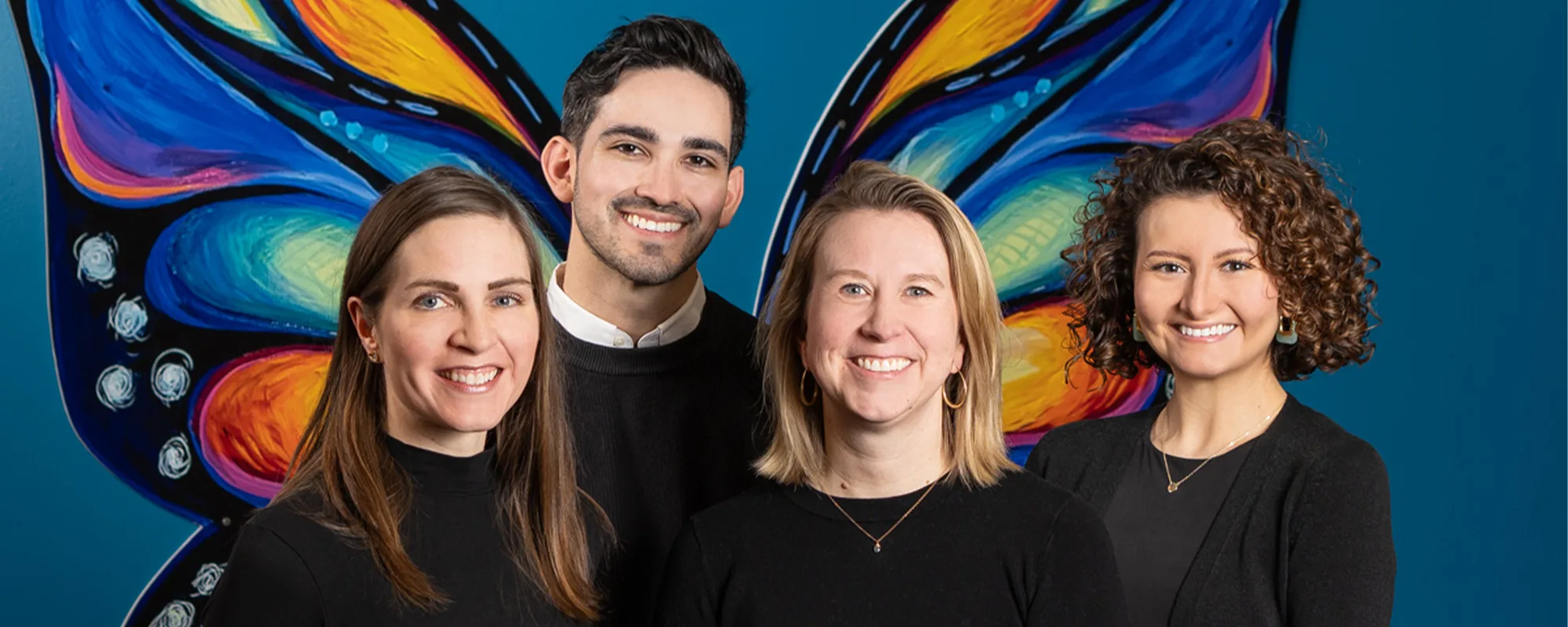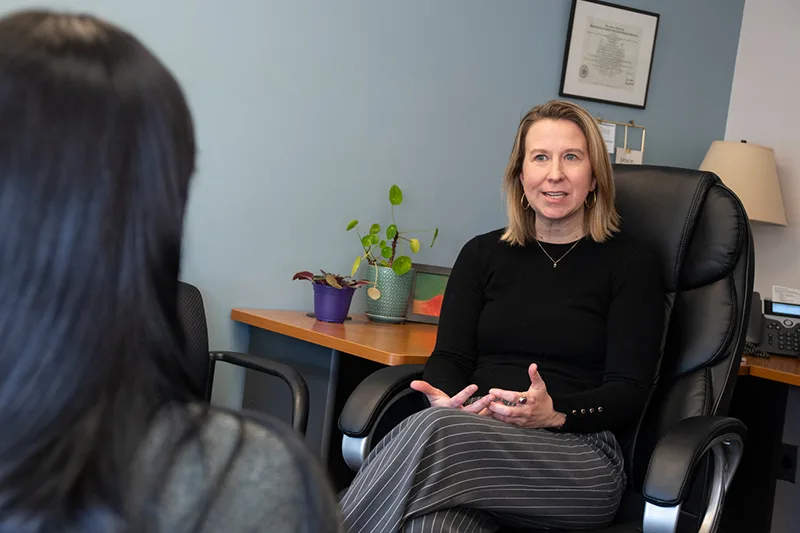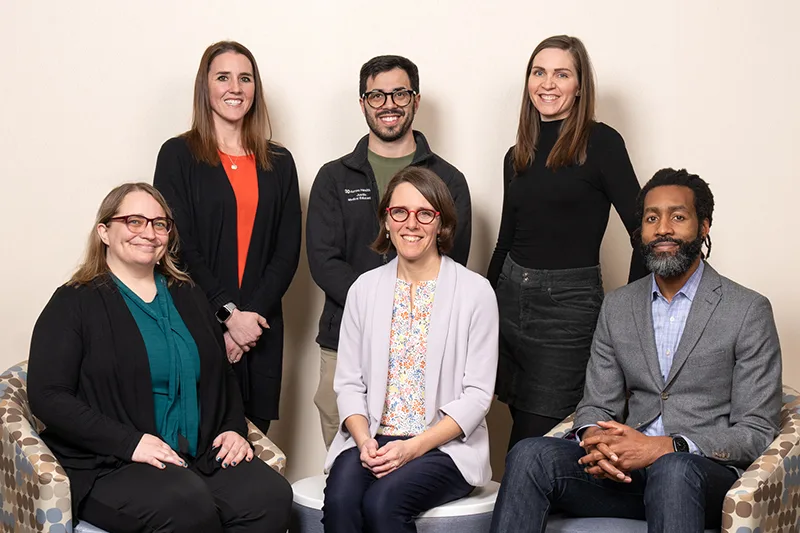Listening to the Latina Community

In the words of Coretta Scott King: “The greatness of a community is most accurately measured by the compassionate actions of its members.”
Compassion abounds in a community project facilitated since 2012 by generations of medical students in the University of Wisconsin School of Medicine and Public Health’s Training in Urban Medicine and Public Health (TRIUMPH) Program. The art of listening is the heart of the Raíces project at the Sixteenth Street Community Health Centers (SSCHC), where medical students support parents whose Latina daughters are receiving mental health care, says Melissa Waldo, LCSW, an SSCHC psychotherapist and the project founder and mentor.
The School of Medicine and Public Health (SMPH) developed TRIUMPH to promote health and health equity in medically underserved urban communities. Following a year and a half of medical education in Madison, medical students in TRIUMPH move to Milwaukee, Wisconsin, where they complete a core curriculum, required clinical rotations, and community projects that delve into historical, contextual, and social determinants of health.
TRIUMPH students who are matched with Raíces at the SSCHC — a federally qualified health center that serves mostly Spanish-speaking patients — commit to leading weekly, two-hour, group sessions for parents. Presenting in Spanish, Raíces facilitators aim to increase understanding and reduce stigma surrounding mental illness and empower parents to support their children suffering from mental illness in a culturally sensitive way.
Raíces is run simultaneously with the 16-week Self-Esteem, Empathy, Empowerment, Discovery of Self (SEEDS) Program, in which 13- to 16-year-old Latinas attend small-group mental health therapy. Statistics show that Latina adolescents are disproportionately impacted by mental illness, including suicide, yet they are less likely to receive mental health treatment compared to non-Hispanic white peers, partly due to stigma in the community.
Medical students are coached by Waldo and by TRIUMPH Associate Director Michelle Buelow, MD ’11, MPH, who has served as the faculty advisor for SEEDS and Raíces since 2014, after she completed a family medicine residency at Allina Health in St. Paul, Minnesota, and returned to Milwaukee. Buelow was among the first TRIUMPH graduates and one of the first TRIUMPH alumni to establish a practice at SSCHC.

“Melissa Waldo and Dr. Buelow have been the ‘glue’ for SEEDS, which Melissa started and involved TRIUMPH students in 2012, and for Raíces, which the medical students started with her guidance a few years later,” says TRIUMPH Director Kjersti Knox, MD ’11 (PG ’14), who also earned her medical degree from SMPH’s urban program followed by an SMPH-affiliated family medicine residency at Advocate Aurora Health in Milwaukee.
Waldo recalls that Kayla Flores, MD ’12 — now a family medicine physician at Aurora Health Care who mentors a TRIUMPH student on a community-based, health-improvement project that serves Spanish-speaking patients — was the first TRIUMPH student to help with SEEDS when it was a free social-support group, and she helped transition it into a billable emotional treatment group.
“Subsequent TRIUMPH students realized that the parents, who were dropping off their daughters every week for two hours, had little or no knowledge of the topics we were addressing, such as depression, self-harming behaviors, peer pressure, bullying, dating violence, and more,” says Waldo. “Initially, the medical students developed handouts about the topic of each week’s SEEDS session.”
Nearly every year since 2012, one or more TRIUMPH students have helped facilitate SEEDS and/or build and run Raíces, which means “roots” in Spanish.
Jenny Giang-Griesser, MD ’18, a TRIUMPH graduate who is now a family medicine physician with obstetrics at Sea Mar Community Health Centers in Seattle, recalls, “The parents requested a group to learn more about mental health and how to better support their children through this process.”
TRIUMPH Program Manager Melissa Lemke, says, “The students really listened to the community and helped fill a gap.”
Giang-Griesser recalls, “I worked with Melissa Waldo to design the parent aspect of the curriculum, and the following year, Paloma [Reinoso Vazquez, MD ’19] joined the project and helped me co-pilot the curriculum.”
Reinoso-Vazquez — who is completing a child and adolescent psychiatry fellowship at University of Illinois Chicago (UIC) — says her experiences with TRIUMPH helped shape her career as a leader in medicine. In September 2024, she will enter a women’s health and child psychiatry faculty position at UIC and will become the associate program director for that university’s Psychiatry Residency Program.
Subsequent medical students have helped adapt Raíces. During the pandemic, they temporarily turned SEEDS into a virtual program, while Raíces took a break for logistical reasons.
As of March 2024, Raíces is being run by a fourth-year medical student, Andrea Niño de Guzman Ramirez; two third-year medical students, Rodrigo De La Torre and Alejandra Torres Diaz; and a second-year medical student, Gabriella Geiger. Having at least two students working on Raíces allows them to cover for each other at busy times and makes sure mentoring happens.
“Initially, Alejandra and I observed how Andrea handled conversations, and that gave us confidence to start leading sessions on our own,” shares De La Torre.
Niño – who will graduate from SMPH in May 2024 and enter a psychiatry residency — recalls that she wanted to make a difference in some aspect of neurobiology, so she earned an undergraduate degree in neurobiology and psychology at UW–Madison while working in a research lab.
“I enjoyed my work, but I was craving the human aspect of helping people,” reflects Niño, who next volunteered to work with immigrant families at the Latino Health Council and at a free health clinic. “This helped me combine my love for helping immigrants and my passion for psychiatry.”
She continues, “I met a wonderful mentor, Dr. Patricia Téllez-Girón, who helped me decide to go to medical school. I was accepted to the UW School of Medicine and Public Health — where my sister [Mariana Niño de Guzman Ramirez, MD ’21, MPH ’21] was attending in TRIUMPH and working on Raíces. I was drawn to TRIUMPH because there are a lot of Latino people in Milwaukee.”
Like several students on the Raíces project, Niño can relate to the families served. Before she was born, her father immigrated from Bolivia to Mexico so he could safely study engineering and start a career; he then met her mom, and they had children in Guadalajara, Mexico. When her father’s job transferred to Hartland, Wisconsin, the family relocated.

“I immigrated at about the age of the teens we see in SEEDS. It has been an eye-opening experience to talk to their parents and learn what they are going through as they navigate two cultures, including the American culture they had never experienced, but their children are growing up with,” says Niño. “It is healing to sit with parents who are doing all they can, especially when their children have depression or have attempted suicide, and the family has been impacted.”
Waldo adds, “We realized the importance of understanding and addressing perceptions around mental health through the cultural lens and the importance of parents learning how to talk to their children about these things. Otherwise, when they find out that their child is self-harming, for instance, their natural response may look like anger or disappointment when it’s really fear or anxiety related to not understanding it.”
Decreasing the stigma related to mental health is among De La Torre’s motivations for participating in Raíces. When applying to medical schools, he was drawn to TRIUMPH by its “focus on centering community assets and voices to help us serve our communities more effectively and adapt to their evolving needs.”
As an undergraduate majoring in neurobiology at New York University, he helped teach health workshops for high school students. That experience, “drew me into helping improve health literacy in areas where it’s most needed,” says De La Torre, who speaks Spanish and enjoys helping others in that language.
Hailing from Tucson, Arizona, with parents who grew up in Mexico, De La Torre was struck by seeing his extended family members struggle with cancer diagnoses and care.
“Seeing how health literacy influenced my family’s and community’s relationship with medicine and overall health has driven me to continue sharing evidence-based medical knowledge with my patients and community to empower them to make informed decisions about their health,” he says, adding that his background in neurobiology research, interest in the mechanisms underlying neurodegeneration, and goals to help prevent and mitigate its progression are shaping his future plans.
“The brain has a remarkable ability to adapt. I look forward to taking part in research that will improve the quality of life of patients and families,” notes De La Torre.
He admires the way TRIUMPH and Raíces make sure the direction of change comes from the community.
Niño says, “By seeing family members weekly, we can really listen to their needs and connect them to resources that will improve their quality of life and family structure. A traditional medical approach is not going to solve a lot of their issues or stressors, including poverty. TRIUMPH and Raíces take a holistic approach, and I really appreciate that.”
Torres Diaz adds, “TRIUMPH emphasizes the importance of looking at the assets of your community and having the mindset that you are there to incorporate yourself into the community.”
She continues, “I have always had an interest in health disparities, and the Latino community faces many disparities, especially in mental health care. I think Raíces is doing a good job of incorporating Latino values, such as family connections and community support.”
At age 4, Torres Diaz moved from El Salvador to Maryland, where she lived until she entered UW–Madison through the Posse Program, which identifies public high school students with extraordinary academic and leadership potential and supports them as undergraduates. She earned a bachelor’s degree in Spanish and biology before she entered SMPH.
“I chose medicine because I wanted to see more people like me in the field. Through Raíces, I am helping my community members in a way that I would not be able to do without going to medical school,” she says.
Torres Diaz adds that she is inspired by seeing the impact of her work; for instance, pre- and post-program evaluations for SEEDS and Raíces confirm that the teens and parents benefit from their participation.
Knox says the SSCHC has been a consistently strong partner with TRIUMPH. Niño, Torres Diaz, and De La Torre have done or will do clinical rotations there, in addition to their community projects. Several students have presented about SEEDS and Raíces, and several have gone into fields that intersect with mental health care.
As Waldo has gradually transitioned to her new role of the SSCHC’s vice president of behavioral health, she is passing SEEDS and Raíces to another therapist who trained with her, noting, “It is bittersweet to leave these projects, but I know the new mentor will carry on well. I joke that I will join these programs again in a couple of decades.”
Torres Diaz says, “Every generation of medical students has helped make Raíces stronger, which keeps it going.”
About both TRIUMPH and Raíces, Niño observes, “I am receiving more experience than I expected. During my residency interviews, I got excited talking about these programs. Residency directors and residents told me very few trainees get to work in a therapy group or with therapists so early in their training. Plus, I know there are limited numbers of Spanish-speaking therapists who work with Spanish-speaking populations, and very few providers who know how to address the social determinants of health and inequities that this population experiences. The faculty and staff at the Sixteenth Street Community Health Centers know how to help these people.”
Equally excited about her experiences, Torres Diaz shares, “There have been so many changes in terms of mental health and how it’s viewed. I think the Latino community is becoming more open to talking about mental health issues, and I really hope there will be more programs like this around the country.”
TRIUMPH at a Glance
The TRIUMPH program has enrolled more than 225 students since its inception in 2008. The program’s four physician leaders (see photo caption) earned their medical degrees from SMPH through TRIUMPH.
- 55 community organizations partner with TRIUMPH students on public health projects
- 23% of students complete a Master of Public Health degree
- 99% of graduates match to urban residencies
- 56% of graduates choose primary care residencies
- 77% of graduates lead community health initiatives during their residencies
- 34% of graduates return to urban areas of Wisconsin to practice after completing their residencies or fellowships